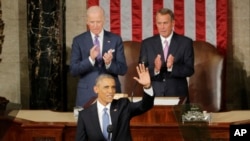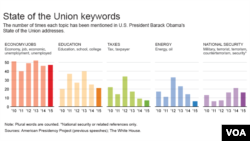As he enters his seventh year at the nation’s helm, President Barack Obama put forward an agenda he said will strengthen national and global security.
Speaking from the U.S. Capitol Tuesday evening, Obama addressed the nation and a Congress in which Republicans control both the Senate and the House of Representatives after winning sweeping victories in the November elections.
At a time of riveting global crises, Obama's speech was mostly about domestic issues, but he touched on several pressing foreign policy challenges.
National security
Obama acknowledged as commander-in-chief his first duty is defending the country.
"We lead best when we combine military power with strong diplomacy; when we leverage our power with coalition building; when we don’t let our fears blind us to the opportunities that this new century presents," the president said.
American leadership is stopping the advance of Islamic State militants in Iraq and Syria, the president said, citing "a broad coalition, including Arab nations, [working] to degrade and ultimately destroy this terrorist group."
Obama called on Congress "to show the world that we are united in this mission by passing a resolution to authorize the use of force against ISIL," he said, using an acronym for the Islamic State group.
The authorization would replace powers that were given to President George W. Bush to prosecute the Iraq war.
Republican Senators John McCain and Lindsey Graham, two sharp critics of Obama, accused the president of bungling the battle against the Islamic State group, also known by the acronym ISIS.
"Despite the president’s claims of progress in the campaign against ISIS, this terrorist army continues to gain thousands of recruits and now controls significantly more territory in Syria than when U.S. airstrikes began there six months ago," they said in a statement.
Increase in cybersecurity
Obama urged increasing cybersecurity to repel invaders, like those who recently attacked Sony Pictures and others who hacked a Pentagon Twitter feed.
"No foreign nation, no hacker, should be able to shut down our networks, steal our trade secrets or invade the privacy of American families, especially our kids," the president said.
He said the U.S. government had taken steps to integrate "intelligence to combat cyber threats, just as we have done to combat terrorism." Obama urged Congress to pass legislation "to better meet the evolving threat of cyber-attacks, combat identity theft and protect our children’s information."
NATO allies
As for the almost yearlong turmoil in eastern Ukraine, Obama reiterated that America was "upholding the principle that bigger nations can’t bully the small." The United State is "opposing Russian aggression, supporting Ukraine’s democracy and reassuring our NATO allies," he said, adding that sanctions have left Russia's "economy in tatters."
Obama emphasized the "persistent, steady resolve" of the United States and its allies.
The president also reprised a promise he made when he first took office and vowed an unrelenting effort to close the U.S. military prison at Guantanamo Bay, Cuba, where foreign terrorism suspects have been held since 2002.
Cuba policy
Obama defended his decision in December to seek to normalize relations with Communist-ruled Cuba and urged Congress to lift the more than 50-year-old U.S. economic embargo against Havana.
"It’s time to try something new," he said. "Our shift in Cuba policy has the potential to end a legacy of mistrust in our hemisphere; removes a phony excuse for restrictions in Cuba; stands up for democratic values; and extends the hand of friendship to the Cuban people."
On Wednesday, a U.S. delegation will be in Havana to open the first round of talks aimed at restoring diplomatic ties. The three-day session follows up on last month’s surprise announcement by Obama and Cuban leader Raul Castro to normalize relations with the communist-led island.
Obama acknowledged one of his guests in the audience: Alan Gross. The American contractor spent five years in a Cuban jail before his release December 17, which coincided with the historic announcement. Since then, Cuba has freed 53 other political prisoners.
US trade deals
Obama had a message for both Democrats and Republicans on trade, where he wants to complete trade deals with Asia and Europe to create more export-related jobs.
He urged Congress to give him trade promotion authority, the power to negotiate free trade deals. Democrats have opposed giving him the power, fearing the deals he makes will hurt American labor.
Warning that China wants to "write the rules for the world's fastest growing region," Obama said both parties should give him the trade authority as a way of protecting American workers, "with strong new trade deals from Asia to Europe that aren't just free, but fair."
Watch full State of the Union Address:
Watch Republican response:
Emphasize American values
Obama also called for strong demonstrations of American values. He reminded of his administration's prohibition on torture, the country's defense of free speech and a rejection of "offensive stereotypes of Muslims, the vast majority of whom share our commitment to peace."
The country's first biracial president said that, "as Americans, we cherish our civil liberties -- and we need to uphold that commitment if we want maximum cooperation from other countries and industry in our fight against terrorist networks."
He praised the American melting pot and "a nation that gave someone like me a chance."
In an oblique reference to the recent deaths of several young black men at the hands of police, Obama called for demonstrating to "every child, in every neighborhood: Your life matters, and we are as committed to improving your life chances as we are for our own kids."
Focus on middle class
Obama’s domestic agenda focused squarely on expanding economic security to poor and middle-income Americans.
"We are 15 years into this new century. Fifteen years that dawned with terror touching our shores; that unfolded with a new generation fighting two long and costly wars; that saw a vicious recession spread across our nation and the world," Obama said.
"It has been, and still is, a hard time for many. But tonight, we turn the page," he said. "The shadow of crisis has passed, and the State of the Union is strong."
The president touted the rebounding U.S. economy, with its "shrinking deficits, bustling industry and booming energy production," and a 5.6 percent unemployment rate, the lowest since 2008.
But while incomes have been rising among well-to-do Americans, wages have not kept pace. In past weeks, Obama has promoted policies he said would spread the economic benefits to those who have largely been shut out of the recovery.
Improving middle-class economics "means helping working families feel more secure in a world of constant change,” the president said. "That means helping folks afford child care, college, health care, a home, retirement. ..."
Lower taxes, raise wages
The budget he's submitting to Congress in two weeks "will address each of these issues, lowering the taxes of working families and putting thousands of dollars back into their pockets each year."
He called for higher wages to help families make ends meet.
To enable those higher wages and ensure a U.S. workforce competitive, the United States should "do more to help Americans upgrade their skills," Obama said, repeating his call for free tuition for community college.
To offset tuition costs and tax breaks for middle-income Americans, Obama has proposed raising taxes on profits that individuals make from selling such assets as stocks, bonds and real estate, ending tax breaks for inherited estates worth millions of dollars, and imposing a fee on the country's biggest financial firms. Those measures would generate revenues estimated at $320 billion.
"Let’s close loopholes so we stop rewarding companies that keep profits abroad, and reward those that invest in America," the president said. "Let’s use those savings to rebuild our infrastructure and make it more attractive for companies to bring jobs home."
Simplify tax code
He also called for simplifying and adjusting the tax code, which now allows "the top 1 percent to avoid paying taxes on their accumulated wealth."
As Obama has unveiled some of his proposals in recent days, Republicans have sharply attacked them as too costly. Opposition lawmakers say higher taxes would derail improvement in the U.S. economy, the world's largest.
Exercise veto power
Congress is unlikely to enact Obama's tax plan. But, by making the proposal, Obama is likely setting the stage for a major debate as the United States heads into next year's presidential election to pick his successor.
For his part, Obama has vowed to veto a number of Republican priorities. These include congressional approval of a controversial oil pipeline from Canada to the central U.S., as well as changes to undercut the health care reform law and Wall Street financial restrictions.
Republican response
In giving the opposition party's traditional response to the Democratic president, Republican Senator Joni Ernst said the new GOP-led Congress would give renewed emphasis to initiatives targeting job creation and repealing Obama's health care law.
Ernst reiterated a Republican desire to cut federal spending and balance the nation's budget, while also expanding America's economic engagement with the world.
"Let's tear down trade barriers in places like Europe and the Pacific," the first-term senator from Iowa said. "Let's sell more of what we make and grow in America over there so we can boost manufacturing, wages and jobs right here at home."
Ernst also said Congress will discuss ways to confront terrorism, by individuals and groups such as al-Qaida and the Islamic State.
"The forces of violence and oppression don't care about the innocent," she said. "We need a comprehensive plan to defeat them."
Obama Heads Out to Sell Economic Plan
One day after delivering his State of the Union speech Obama headed to the nation's conservative heartland to promote the centerpiece of his address - a plan for bolstering the middle class.
The president left Washington Wednesday for a two-day trip to Idaho and Kansas. He was to tell audiences that everyone would stand to gain from an economy that has all but recovered from years in the doldrums. White House officials say the president deliberately chose conservative states for his first stops following his annual address to Congress.
Some material for this report came from Reuters and AP.






